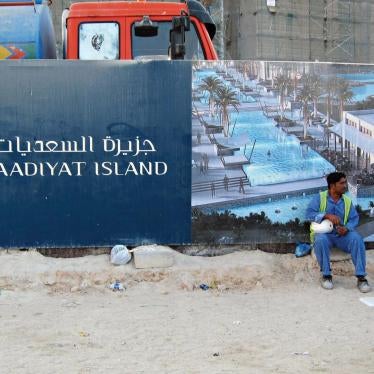(Beirut) – Western educational and cultural institutions and their Emirati development partners have made important commitments to address the exploitation and abuse of South Asian migrant workers, but protection gaps remain, Human Rights Watch said in a report released today. The workers are building a US$22-billion island development in the United Arab Emirates.
The 85-page report, “The Island of Happiness Revisited: A progress report on institutional commitments to address abuses of migrant workers on Abu Dhabi’s Saadiyat Island,” said the gaps include reimbursing workers for recruiting fees, which often take months or years to repay and are the single greatest factor in creating conditions of forced labor. Human Rights Watch also found lapses in effectively punishing abusive contractors and following through on promises to make monitoring reports public. The island will include local branches of New York University (NYU) and the Louvre and Guggenheim Museums, among other prominent projects.
“For too long, migrant workers in the UAE have toiled in abusive conditions, with private and public developers showing little concern,” said Sarah Leah Whitson, Middle East director at Human Rights Watch. “Now, finally, Emirati developers and their international partners have stepped up to the plate on Saadiyat Island to start to protect workers, but they will need to do more to curtail the abuses.”
Human Rights Watch found notable improvements since its first report on the subject in 2009. In particular, Human Rights Watch cited the commitments by leading educational and cultural bodies and their UAE development partners to ensure regular payment of wages, rest breaks and days off, and employer-paid medical insurance, and to hire independent monitors to detect and report publicly on violations of workers’ rights on the island. However, the progress report also found that many workers are still paying recruitment fees to obtain jobs, which frequently trap them in debt.
In addition, Human Rights Watch found that contractors are regularly confiscating worker passports and substituting worker contracts with less favorable ones when the workers arrive in the UAE. While the developers and institutions on Saadiyat have pledged to end these practices, and the scale of the problems Human Rights Watch documented is not as bad as in 2009, the continuation of poor practices in a number of cases reflects ongoing gaps in protection. The parties that benefit from these ventures need to make an unequivocal pledge to reimburse workers found to have paid recruitment fees in contravention of existing policies. The educational and cultural institutions and local developers also need to investigate and effectively enforce penalty provisions against contractors who disregard policies meant to protect workers from abuse.
Despite pledges by the institutions to address recruitment fees and UAE laws that prohibit agencies from charging them, almost all of the workers interviewed by Human Rights Watch reported paying between US$900 and $3,350 to agents in their home countries when seeking employment in the UAE, including some who had arrived recently and worked only on Saadiyat Island projects. With meager incomes and few assets, workers often took out loans at high monthly interest rates to pay these fees, which they then spend months or years working to pay back.
Given the continued prevalence of the practice of requiring the workers to pay recruiting fees, the report urged all parties to promise to ensure that workers are reimbursed for any recruiting fees they are found to have paid to secure employment on the island.
The low-lying island in the Arabian Gulf will have an NYU campus, museums, and a performing arts center – each designed by world-renowned architectural firms – as well as golf courses, hotels, and luxury residences. Workers from India, Pakistan, Bangladesh, and other South Asian countries have been building the island's infrastructure since Abu Dhabi formed the Tourism Development and Investment Company (TDIC) to oversee parts of the project in 2005. The Louvre Abu Dhabi and the Guggenheim are scheduled to open in 2015 and 2017, respectively. Abu Dhabi’s Executive Affairs Authority (EAA) is responsible for the development and construction of the NYU campus, scheduled to open in 2014.
The report noted that workers also reported a lack of information, or misleading information, about their terms of employment before arrival in the UAE; and, for some workers who did not live in the Saadiyat Island Workers’ Village, overcrowded and unhygienic housing conditions. Contrary to commitments by the developers to ensure that workers retain custody of their passports, only one worker of the 47 interviewed working on the island itself reported that he had retained his passport.
The early 2011 appointments of independent monitors to detect and report publicly on violations of workers’ rights on the island were a significant and positive development, the report noted. However, the developers and their foreign partners need to do more to ensure that adequate accountability measures are put in place, Human Rights Watch said.
TDIC and EAA have not yet reported publicly on any findings by the new monitors they have appointed or any steps taken in response to their findings, Human Rights Watch said. Moreover, to date they have not made public key components of their monitoring programs – such as terms of reference, scope of monitoring, and research methodology – that might demonstrate that the monitoring is credible and independent. It is unclear whether they plan to do so.
“By acknowledging the need for independent monitoring, Saadiyat developers have raised the bar for other development projects in the region,” Whitson said. “But monitoring alone is not enough – TDIC and EAA need to remain vigilant by punishing offending contractors and disclosing these penalties publicly.”






